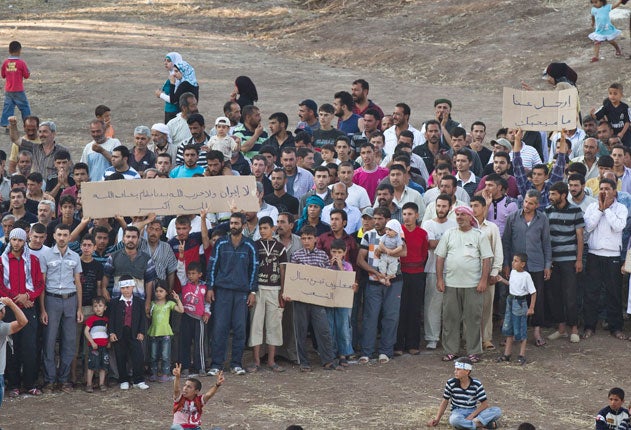UN resolution founders as Assad blames 'saboteurs' for inciting violence in Syria

Your support helps us to tell the story
From reproductive rights to climate change to Big Tech, The Independent is on the ground when the story is developing. Whether it's investigating the financials of Elon Musk's pro-Trump PAC or producing our latest documentary, 'The A Word', which shines a light on the American women fighting for reproductive rights, we know how important it is to parse out the facts from the messaging.
At such a critical moment in US history, we need reporters on the ground. Your donation allows us to keep sending journalists to speak to both sides of the story.
The Independent is trusted by Americans across the entire political spectrum. And unlike many other quality news outlets, we choose not to lock Americans out of our reporting and analysis with paywalls. We believe quality journalism should be available to everyone, paid for by those who can afford it.
Your support makes all the difference.Britain conceded defeat in mustering a united international response against Syria yesterday, as President Bashar al-Assad blamed "saboteurs" for stoking anti-government protests that threaten his regime.
As thousands poured on to the streets outraged by the leader's comments, diplomats said privately that there was no realistic chance of the UN Security Council passing a resolution condemning the regime's violent suppression of protests because of stiff opposition led by Russia and China. The admission emerged as Europe's foreign ministers were planning new sanctions against the regime after President Assad defiantly faced down international condemnation of the forceful crackdown.
In only his third speech since widespread anti-government unrest began in mid-March, President Assad floated the possibility of political reforms and presented a proposal to end one-party Baathist rule in Syria. But he also said peaceful protesters were being used as a "shroud" by gunmen intent on carrying out attacks on civilians, and accused the media of being involved in a "conspiracy".
"What is happening today has nothing to do with development or reform," he said, in reference to the unprecedented wave of dissent which has swept across Syria over the past three months. "What is happening is sabotage."
Responding to Mr Assad's speech, thousands of people across Syria reportedly poured on to the streets chanting anti-government slogans. In the Damascus suburb of Irbin, about 300 marchers shouted "No to dialogue with murderers" after listening to the address. "We are on the 98th day of the protest today and Bashar is still in denial," tweeted Malath Aumran, a Syrian blogger. Human rights groups say more than 1,400 civilians have been killed by security forces since the insurrection began. In the weeks following the first wave of protests in March, Mr Assad sought to appease protesters by announcing an end to the country's emergency laws and abolishing a notorious court used to process political prisoners. He announced plans yesterday to expand a recently announced amnesty for political opponents.
But the measures have done little to stem the tide of unrest. More than 10,000 refugees have now fled into Turkey from the country's north-west, escaping an army clampdown in which helicopter gunships strafed villages and troops backed by tanks torched crops and shot dead livestock.
The Baathist regime, which has not faced a crisis of this magnitude since the current President's father, Hafez al-Assad, seized power in 1970, said its operation in north-west Syria was a response to deadly attacks on troops by armed rebels.
In a statement hammered out in Luxembourg yesterday, EU foreign ministers said they were preparing to widen sanctions in response to events in Syria.
Before the meeting, the Foreign Secretary William Hague repeated his demand that Syria's leader reforms or goes. He also urged Turkey to use its regional muscle to engineer a solution. However the Arab League, which in March endorsed the enforcement of a Nato no-fly zone in Libya, came out in support of Mr Assad after his speech. Its deputy secretary-general, Ahmed bin Heli, said Syria was a "main factor of balance and security in the region".
And attempts at a global response have not worked. The Independent understands that the UN Security Council resolution has been quietly dropped after coming up against stiff opposition not just from Russia and China but also from other countries on the Security Council – in particular Brazil and India. They told British diplomats that the "no-fly zone resolution" against Libya had been over-interpreted to justify airstrikes and they were not prepared to support a Syrian resolution.
"The more we have talked to people the further we are from getting any sort of agreement on a resolution," said one diplomatic source. "At the moment a resolution on Syria is a non-starter."
Diplomats have not ruled out resurrecting the resolution at a later date if the situation on the ground changes.
Join our commenting forum
Join thought-provoking conversations, follow other Independent readers and see their replies
Comments